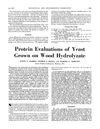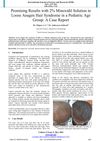 34 citations,
April 2009 in “Expert Opinion on Pharmacotherapy”
34 citations,
April 2009 in “Expert Opinion on Pharmacotherapy” Some treatments work for common baldness, but there's less evidence for other hair loss types, and more research is needed.
 33 citations,
June 2012 in “Journal of Crohn's and colitis”
33 citations,
June 2012 in “Journal of Crohn's and colitis” Alopecia Areata might be linked to Crohn's disease.
 31 citations,
October 2012 in “Dermatologic clinics”
31 citations,
October 2012 in “Dermatologic clinics” Cosmetic hair products are important for hiding hair loss and improving satisfaction when combined with medical treatments.
 27 citations,
September 2018 in “Medicines”
27 citations,
September 2018 in “Medicines” Oleic acid nanovesicles improve minoxidil absorption in hair follicles for alopecia treatment.
 27 citations,
August 2018 in “Therapeutic Delivery”
27 citations,
August 2018 in “Therapeutic Delivery” Nanotechnology could make hair loss treatments more effective and reduce side effects, but more research is needed before it's available.
 24 citations,
January 2020 in “JAAD Case Reports”
24 citations,
January 2020 in “JAAD Case Reports” Topical metformin helped regrow hair in two women with a hard-to-treat scarring hair loss condition.

Oral minoxidil effectively treats hair loss, with women needing lower doses (0.25 to 2.5 mg daily) and men needing higher doses (1.25 to 5 mg daily).
 19 citations,
May 2007 in “Dermatologic therapy”
19 citations,
May 2007 in “Dermatologic therapy” The document concludes that various treatments, including laser therapy, are effective for managing pseudofolliculitis barbae, especially in darker skin types.
 18 citations,
May 2015 in “Australasian Journal of Dermatology”
18 citations,
May 2015 in “Australasian Journal of Dermatology” Serenoa repens extract in topical products improves hair growth and appearance in male pattern baldness with mild side-effects.
 14 citations,
August 2013 in “Facial Plastic Surgery Clinics of North America”
14 citations,
August 2013 in “Facial Plastic Surgery Clinics of North America” Some nonsurgical hair loss treatments are effective, especially if started early.
 13 citations,
January 2016 in “Journal of Ophthalmology”
13 citations,
January 2016 in “Journal of Ophthalmology” A new eyelid shampoo improved eyelid hygiene and eyelash length in people with Meibomian Gland Dysfunction.
 13 citations,
July 1951 in “Industrial & Engineering Chemistry”
13 citations,
July 1951 in “Industrial & Engineering Chemistry” Yeast grown on wood sugar with added methionine could be a cheap alternative to animal protein for feed.
 12 citations,
February 2014 in “Recent Patents on Inflammation & Allergy Drug Discovery”
12 citations,
February 2014 in “Recent Patents on Inflammation & Allergy Drug Discovery” Shampoos have evolved into multifunctional products with patented innovations for different hair needs and can include medicinal herbs for hair and scalp health.
 7 citations,
September 2020 in “Journal of Cosmetic Dermatology”
7 citations,
September 2020 in “Journal of Cosmetic Dermatology” Minoxidil and Finasteride are the most popular hair loss treatments, with rising interest in other options, and economic or health crises can change what treatments people prefer.
 7 citations,
February 2004 in “Canadian Journal of Anesthesia/Journal canadien d anesthésie”
7 citations,
February 2004 in “Canadian Journal of Anesthesia/Journal canadien d anesthésie” Pressure from surgical headrests can cause temporary hair loss in liver donors.
 6 citations,
January 2019 in “Journal of dermatology”
6 citations,
January 2019 in “Journal of dermatology” Immune checkpoint inhibitors used in cancer therapy can cause hair loss, and understanding this can help manage the side effect.
 6 citations,
January 2016 in “Journal of Clinical and Diagnostic Research”
6 citations,
January 2016 in “Journal of Clinical and Diagnostic Research” Topical minoxidil might potentially cause vision problems, but more research is needed.
 3 citations,
November 2016 in “The journal of investigative dermatology/Journal of investigative dermatology”
3 citations,
November 2016 in “The journal of investigative dermatology/Journal of investigative dermatology” Entrepreneurial companies are key to advancing dermatology treatments and patient care.
 2 citations,
March 2019 in “European Journal of Dermatology”
2 citations,
March 2019 in “European Journal of Dermatology” Pharmacy-sold shampoos tend to have fewer allergens compared to those sold in other stores.
 2 citations,
January 2015 in “Elsevier eBooks”
2 citations,
January 2015 in “Elsevier eBooks” The document says biodegradable cosmetics and packaging are better for the environment and user experience.
 1 citations,
July 2023 in “Cutis”
1 citations,
July 2023 in “Cutis” Scalp rolling might help regrow hair in people with a hair loss condition called Alopecia Areata.
 1 citations,
December 2021 in “International journal of research in dermatology”
1 citations,
December 2021 in “International journal of research in dermatology” Dermatologists should learn more about shampoos to better treat hair and scalp issues.
 1 citations,
August 2020 in “Journal of Cosmetic Dermatology”
1 citations,
August 2020 in “Journal of Cosmetic Dermatology” The "After Minoxidil" spray makes hair easier to style, less greasy, and encourages people to keep using the treatment.
 1 citations,
January 2018 in “BMJ”
1 citations,
January 2018 in “BMJ” Many women experience significant hair loss during menopause, and topical minoxidil is an effective treatment.
 December 2023 in “International Journal of Advanced Research in Science, Communication and Technology”
December 2023 in “International Journal of Advanced Research in Science, Communication and Technology” Herbal shampoo is safe, effective, and good for hair and scalp health.
 May 2023 in “International journal of science and research”
May 2023 in “International journal of science and research” 2% minoxidil solution improved hair density and quality in children with Loose Anagen Hair Syndrome.
 April 2021 in “Advances in Cosmetic Surgery”
April 2021 in “Advances in Cosmetic Surgery” Hair restoration can be achieved through non-surgical treatments like minoxidil, antiandrogens, phototherapy, and PRP procedures, or through surgical methods like hair transplantation. Continued treatment is needed to maintain results, and full results are visible after 12-18 months.

The document is a guide for practitioners to successfully perform hair transplants using the FUE method.
 July 2020 in “International journal for research in applied science and engineering technology”
July 2020 in “International journal for research in applied science and engineering technology” The herbal shampoo made from local plants can reduce hair loss and promote hair growth.

Hair properties change under electromagnetic fields and are influenced by individual characteristics and the environment.






























